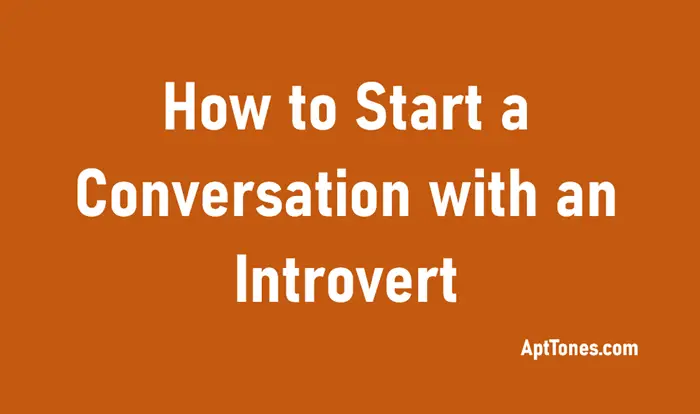In a world where extroverted traits often take the spotlight, understanding how to engage introverts in conversation is a vital skill. Introverts, known for their reflective and often reserved nature, require a unique approach to initiate and sustain dialogue.
This article explores 15 effective ways to start a conversation with an introvert. Each method is tailored to respect their intrinsic qualities while fostering a comfortable environment for communication.

How to Start a Conversation with an Introvert: 15 Ideas
These strategies are not only useful in business environments but also in personal and social settings.
Understanding the nuances of each approach helps in determining the most suitable one based on the context and the individual’s personality.
1. Comment on a Shared Interest or Experience
“I noticed you’re reading [Book Title]. That’s one of my favorites. What do you think of it so far?”
Why it works: This approach taps into a shared interest, making the conversation more inviting for an introvert. It’s best used in situations where you have observed a specific interest, like a book or a hobby, that the introvert is engaged in. By focusing on their interest, you’re allowing them to speak about something they are comfortable with and passionate about.
2. Ask for Their Opinion on a Topic
“I’ve been pondering about [Topic], and I would love to get your take on it. What are your thoughts?”
Why it works: Introverts often appreciate being asked for their opinion, especially on thoughtful topics. This method shows that you value their thoughts and insights, which is empowering. It’s effective in both personal and professional settings where their input can be valuable.
3. Share a Personal Anecdote
“I recently had an interesting experience with [Situation]. Have you ever encountered something similar?”
Why it works: Personal anecdotes can be a great icebreaker. They show your vulnerability and willingness to share, which can make introverts feel more at ease. This approach is best in a casual setting where personal experiences are relevant.
4. Give a Sincere Compliment
“I’ve noticed your work on [Project/Task]. It’s really impressive. How did you approach it?”
Why it works: A sincere compliment shows that you’ve noticed and appreciate their efforts or talents. This method is effective in both professional and social contexts. It opens the door for them to share more about their interests or achievements.
5. Ask Open-Ended Questions
“What’s your perspective on [Current Event/Topic]?”
Why it works: Open-ended questions encourage thoughtful responses and give introverts the opportunity to express themselves freely. This approach is suitable in situations where you want to encourage a deeper conversation.
6. Invite Them to Share a Recommendation
“I’m looking for recommendations on [Books/Movies/Restaurants]. Do you have any favorites?”
Why it works: This method leverages their interests and expertise, making them feel valued. It’s great for both personal and professional settings where you want to learn more about their preferences.
7. Acknowledge Their Presence in a Group Setting
“We haven’t heard your thoughts yet, [Name]. Would you like to share your perspective on this?”
Why it works: In group settings, introverts may not readily jump into the conversation. Acknowledging their presence and inviting them to speak shows respect for their input. This approach should be used sensitively to avoid putting them on the spot.
8. Connect Over a Mutual Acquaintance or Experience
“I heard from [Mutual Acquaintance] that you’re experienced in [Field/Skill]. I’m curious to learn more about it.”
Why it works: Connecting over a mutual acquaintance or shared experience creates a sense of familiarity. This approach is effective in networking or social events where you have a common connection.
9. Comment on the Environment or Setting
“This [Event/Place] is really [Adjective]. Have you been here before?”
Why it works: Commenting on your immediate surroundings can be a natural and unobtrusive way to start a conversation. It’s suitable for casual encounters, like at events or in public places.
10. Inquire About Their Well-Being
“How have you been finding [Current Situation/Environment]?”
Why it works: Asking about their well-being shows concern and interest in their life. This approach is best in situations where you have some prior acquaintance with the introvert.
11. Discuss a Common Challenge
“I’ve been trying to tackle [Challenge]. Have you faced something similar?”
Why it works: Sharing a common challenge can create a bond of empathy. It’s effective in settings where you’re both facing similar situations, like in a workplace.
12. Offer Assistance or Advice
“If you need any help with [Task/Challenge], I’d be glad to share my experience.”
Why it works: Offering help or advice can be a way to show that you are approachable and willing to engage. Use this in situations where you genuinely can assist.
13. Bring Up a Recent Event or News Item
“Have you heard about [Recent Event/News]? What’s your take on it?”
Why it works: Discussing recent events can be a good way to start a conversation, especially if it’s relevant to their interests or field. This approach is suitable for more informal or spontaneous conversations.
14. Compliment Their Skill or Ability
“Your ability to [Skill/Task] is really admirable. How did you develop it?”
Why it works: Complimenting a specific skill or ability can be very flattering and encouraging. Use this approach in situations where you’ve observed a particular talent they possess.
15. Show Genuine Curiosity
“I’m really curious to know more about your experience with [Topic/Activity]. Could you tell me more?”
Why it works: Showing genuine curiosity about their interests or experiences can be very engaging for an introvert. This approach is best when you are genuinely interested in learning more about them.
Wrap-up
Each of these conversation starters respects the nature of introverts while providing a comfortable platform for them to express themselves. The key is to be attentive, empathetic, and respectful of their responses, creating a dialogue that is both meaningful and enjoyable.